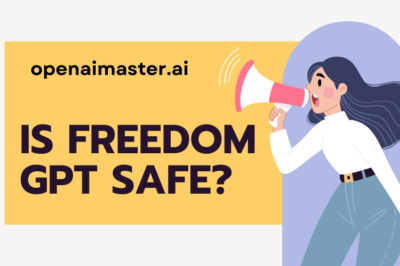
Introduction
Is FreedomGPT Safe?
In the era of rapidly advancing artificial intelligence, the emergence of text generation models like FreedomGPT has sparked both excitement and concerns regarding its safety and reliability. FreedomGPT, a variant of OpenAI’s GPT model, is designed to generate human-like text based on the input it receives. While it offers numerous possibilities for various applications, questions persist about its safety, particularly in terms of misinformation, biases, and potential misuse. This article aims to delve into the safety aspects of FreedomGPT, addressing its strengths, weaknesses, and the measures in place to mitigate risks.
Understanding FreedomGPT
FreedomGPT is an AI language model developed by OpenAI, trained on vast amounts of text data to generate coherent and contextually relevant responses. Its architecture allows it to understand and mimic human language patterns, making it capable of producing a wide range of content, from news articles to creative writing and technical documentation.
Strengths of FreedomGPT
- Language Fluency: FreedomGPT excels in fluently generating text that mimics human writing patterns, making it suitable for various language-related tasks.
- Versatility: Its versatility enables it to adapt to different writing styles and genres, catering to diverse user needs.
- Efficiency: FreedomGPT can quickly generate large volumes of text, aiding productivity in tasks such as content creation and data analysis.
Concerns Surrounding Safety
Despite its capabilities, FreedomGPT raises several safety concerns that warrant attention:
- Misinformation: There’s a risk that FreedomGPT could propagate false information if not monitored adequately. It may inadvertently generate content that is misleading or inaccurate, posing challenges in discerning reliable information from generated text.
- Bias Amplification: Like many AI models, FreedomGPT can reflect and potentially amplify biases present in its training data. This raises concerns about reinforcing societal biases or stereotypes in the text it generates.
- Manipulation and Abuse: Malicious actors could exploit FreedomGPT to generate deceptive content for various purposes, including spreading misinformation, phishing attacks, or manipulating public opinion.
Mitigating Risks
To address these concerns, several strategies and safeguards are being implemented:
- Data Filtering and Monitoring: OpenAI employs rigorous data filtering techniques to remove biased or harmful content from the training data. Continuous monitoring helps identify and address emerging issues promptly.
- Bias Detection Algorithms: Algorithms are being developed to detect and mitigate biases in the output generated by FreedomGPT. These algorithms aim to identify and flag potentially biased or sensitive content for review.
- User Guidelines and Education: OpenAI provides guidelines for users to responsibly leverage FreedomGPT, emphasizing ethical usage and awareness of potential risks. Educating users about the limitations of AI models can help prevent misuse and promote safe practices.
- Community Oversight: Engaging the broader community in monitoring and assessing the output of FreedomGPT can help identify problematic content and develop solutions collaboratively.
Ensuring Ethical Use
While technological advancements offer tremendous potential, ensuring the ethical use of AI models like FreedomGPT remains paramount. Key principles to uphold include:
- Transparency: OpenAI strives to maintain transparency regarding the capabilities and limitations of FreedomGPT, fostering informed decision-making among users.
- Accountability: Establishing accountability frameworks encourages responsible behavior among developers, users, and other stakeholders involved in deploying AI models.
- Continuous Evaluation and Improvement: Regular evaluation and iteration of safety measures are essential to adapt to evolving threats and challenges effectively.
Conclusion
FreedomGPT represents a significant advancement in AI-driven text generation, offering unprecedented capabilities with the potential to revolutionize various industries. However, ensuring its safety requires proactive measures to address concerns related to misinformation, biases, and misuse. By leveraging strategies such as data filtering, bias detection, and community oversight, alongside promoting ethical usage practices, we can harness the benefits of FreedomGPT while mitigating associated risks. Ultimately, a collaborative effort involving developers, users, and policymakers is essential to foster a safe and responsible AI ecosystem.
FAQ’s:







